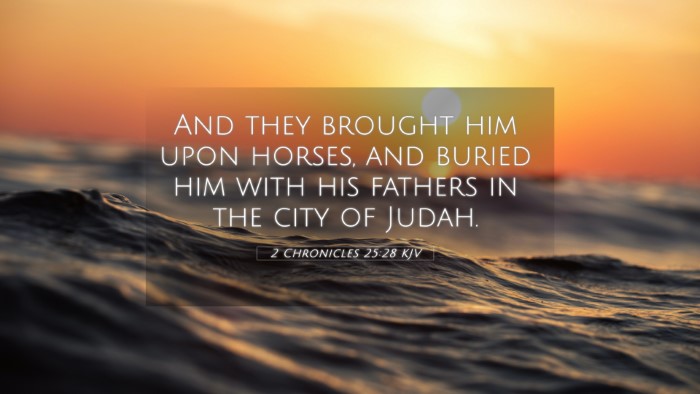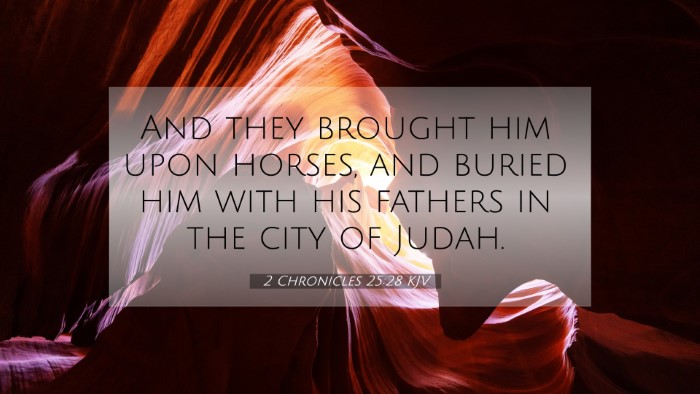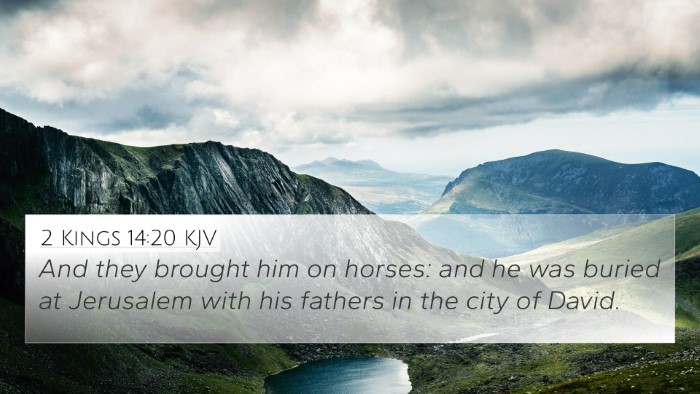Understanding 2 Chronicles 25:28
2 Chronicles 25:28 reads: "And they brought him upon horses, and buried him with his fathers in the city of Judah." This verse encapsulates a moment of respect and dignity following the death of King Amaziah, illustrating the customs of burial and the importance of honoring one's lineage in biblical times.
Contextual Background
To fully grasp the implications of this verse, we must consider the historical context. Amaziah, the king of Judah, had a tumultuous reign that ended in his defeat and subsequent assassination. Following his death, the treatment of his remains highlights the reverence with which kings were treated, even those whose reigns were marred with conflict.
Insights from Public Domain Commentaries
Matthew Henry's Commentary
Matthew Henry notes that Amaziah's burial is indicative of the respect owing to his royal position, despite the nature of his rule. The act of being buried "with his fathers" symbolizes continuity of lineage and the significance of ancestral connection in the culture of Israel. It also serves as a reminder of the divine covenant with David, as kings were expected to maintain their fidelity to God's statutes in their leadership.
Albert Barnes' Commentary
Barnes emphasizes the importance of burial practices in ancient Israel, as it signified one's social status and legacy. He argues that the manner of Amaziah’s burial reflects a broader theme of God's providence and justice, illustrating that despite human failure, there is a divine order that underpins the monarchy. Amaziah's burial amidst his ancestors attests to the enduring monarchy of Judah and invites reflections on the integrity of leaders.
Adam Clarke's Commentary
Adam Clarke points out that the burial of kings was often accompanied by considerable pomp and ceremony, signifying their status and the historical narratives intertwined with their reigns. Clarke suggests that by noting the horses used for transport, the text reveals the respect afforded to Amaziah, despite the crisis that engulfed his last days.
Thematic Analysis
This verse can be linked to broader themes in the Scriptures concerning authority, legacy, and the eventual justice of God. The transition of power and the way rulers are honored after their demise often reflect the spiritual and moral character of their reign.
Cross-References for Deeper Study
- 2 Kings 14:20 - Discusses the manner of Amaziah's death and his burial.
- 1 Chronicles 29:26-28 - Chronicles the reign and burial of King David, highlighting the importance of royal obsequies.
- 2 Chronicles 21:20 - Talks about the legacy of another king and his burial, reflecting the sentiments around royal burials.
- Deuteronomy 34:6 - Mentions the burial of Moses, contrasting leadership and divine approval.
- Jeremiah 22:18-19 - Offers insight into other kings' fates, focusing on their dishonor after death due to their actions.
- Psalm 78:67-68 - Discusses God choosing the tribe of Judah, connecting themes of divine selection and its implications for leaders.
- Isaiah 14:18 - Speaks of the burial of kings indicating the finality of human authority and God's ultimate judgment.
- Ecclesiastes 6:10 - Reflects on the futility of striving for legacy, thus linking to the theme of respect due to authority.
- Matthew 27:57-61 - Highlights the burial of Jesus, drawing parallels between the treatment of earthly kings and the King of Kings.
- Acts 13:36 - Discusses the mortality and legacy of David, reminding us of the mortality and spiritual impact of earthly rulers.
Conclusion
2 Chronicles 25:28 serves as a powerful reminder of the cultural and spiritual practices surrounding leadership and legacy in biblical Israel. Through the lens of various commentaries, we gain a multi-faceted understanding of the verse, highlighting the theological significance of royal burials and the connections between leaders in the Old Testament. In studying this passage, we uncover profound insights applicable to our understanding of leadership, legacy, and divine judgment, as well as reflections on how this verse interconnects with numerous other Scriptures.



